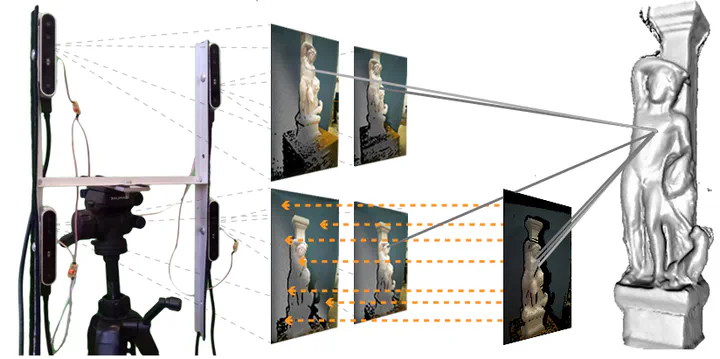Self-Supervised Deep Depth Denoising
Oct 29, 2019·,,, ,,,·
1 min read
,,,·
1 min read
Vladimiros Sterzentsenko
Leonidas Saroglou
Spyridon Thermos
Anargyros Chatzitofis
Nikolaos Zioulis
Alexandros Doumanoglou
Dimitrios Zarpalas
Petros Daras
 The H structure used to collect the data for self-supervision.
The H structure used to collect the data for self-supervision.Abstract
Depth perception is considered an invaluable source of information for various vision tasks. However, depth maps acquired using consumer-level sensors still suffer from non-negligible noise. This fact has recently motivated researchers to exploit traditional filters, as well as the deep learning paradigm, in order to suppress the aforementioned non-uniform noise, while preserving geometric details. Despite the effort, deep depth denoising is still an open challenge mainly due to the lack of clean data that could be used as ground truth. In this paper, we propose a fully convolutional deep autoencoder that learns to denoise depth maps, surpassing the lack of ground truth data. Specifically, the proposed autoencoder exploits multiple views of the same scene from different points of view in order to learn to suppress noise in a self-supervised end-to-end manner using depth and color information during training, yet only depth during inference. To enforce self-supervision, we leverage a differentiable rendering technique to exploit photometric supervision, which is further regularized using geometric and surface priors. As the proposed approach relies on raw data acquisition, a large RGB-D corpus is collected using Intel RealSense sensors. Complementary to a quantitative evaluation, we demonstrate the effectiveness of the proposed self-supervised denoising approach on established 3D reconstruction applications. Code is avalable at
.
Type
Publication
In 2019 IEEE/CVF International Conference on Computer Vision (ICCV)
Click the Cite button above to copy/download publication metadata (*.bib).